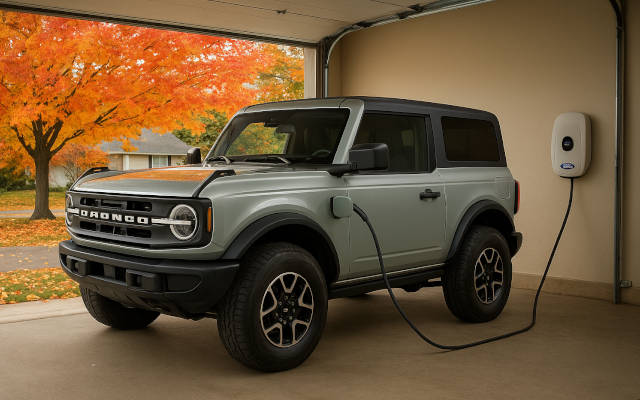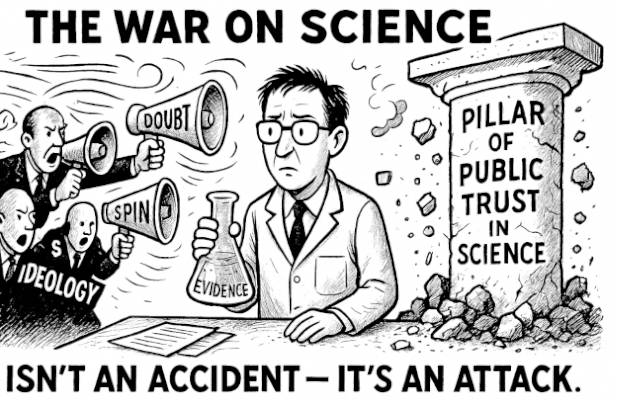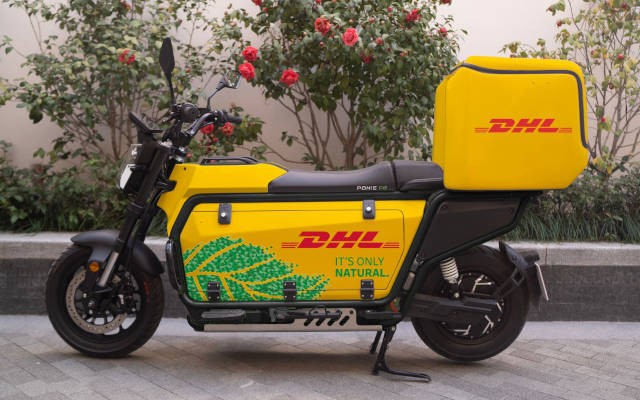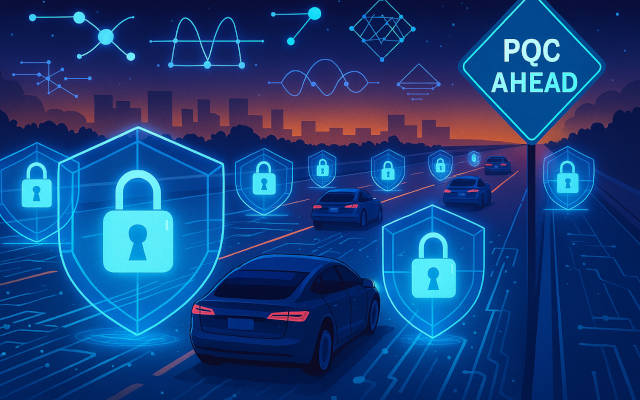 EDITOR'S PICK
EDITOR'S PICK
Ford Faces EV Crossroads as Federal Incentives Expire
02 Oct 2025 | Synopsis
 Ford CEO Jim Farley warns that U.S. EV sales could drop by half following the expiration of the $7,500 federal tax credit, citing high vehicle costs and reduced consumer demand. Ford is shifting focus to hybrids and more affordable EVs, while some dealers see the change as a chance to test market strength without subsidies. The industry faces uncertainty as it adapts to a post-incentive landscape.
Ford CEO Jim Farley warns that U.S. EV sales could drop by half following the expiration of the $7,500 federal tax credit, citing high vehicle costs and reduced consumer demand. Ford is shifting focus to hybrids and more affordable EVs, while some dealers see the change as a chance to test market strength without subsidies. The industry faces uncertainty as it adapts to a post-incentive landscape.The LNG Detour: What Scotland's New Ferry Teaches US
02 Oct 2025 | Synopsis
 Scotland's Glen Sannox ferry, launched as a “green” LNG-powered vessel, emits more greenhouse gases than its diesel predecessor due to underestimated methane slip. Despite improved local air quality, real-world data shows LNG's climate impact is worse over short timeframes. The project highlights how optimistic assumptions and delayed construction turned a sustainability effort into a cautionary tale about transitional fuels and lifecycle emissions.
Scotland's Glen Sannox ferry, launched as a “green” LNG-powered vessel, emits more greenhouse gases than its diesel predecessor due to underestimated methane slip. Despite improved local air quality, real-world data shows LNG's climate impact is worse over short timeframes. The project highlights how optimistic assumptions and delayed construction turned a sustainability effort into a cautionary tale about transitional fuels and lifecycle emissions.The Current War On Science, Who's Behind It And Why
02 Oct 2025 | Synopsis
 Science Under Siege asserts the undermining of science is not accidental but largely driven by ideological, economic, and political forces. It points fingers at special interests, political actors, and media amplifying doubt for gain. It also critiques how scientists themselves sometimes contribute by failing to communicate clearly or by letting funding and institutional pressures interfere with objectivity. The result: erosion of public trust, polarized discourse, and weakened science-based policy.
Science Under Siege asserts the undermining of science is not accidental but largely driven by ideological, economic, and political forces. It points fingers at special interests, political actors, and media amplifying doubt for gain. It also critiques how scientists themselves sometimes contribute by failing to communicate clearly or by letting funding and institutional pressures interfere with objectivity. The result: erosion of public trust, polarized discourse, and weakened science-based policy.PNY Electric Cargo Scooter Completes Successful Multi-Location Last-Mile Delivery Trials
01 Oct 2025 | Synopsis
 PNY's Ponie P2, the world's first electric cargo motorcycle, completed successful trials across Tel Aviv, Milan, and other urban locations with partners like DHL and postal services. Manufactured in Israel, the P2 features a top speed of 100 km/h, high payload capacity, modular cargo options, and a 160 km range. Compared to gas-powered delivery vehicles used by Wolt - a Finnish delivery platform - it offers lower fuel and maintenance costs, making it a cost-effective, zero-emission solution for last-mile logistics.
PNY's Ponie P2, the world's first electric cargo motorcycle, completed successful trials across Tel Aviv, Milan, and other urban locations with partners like DHL and postal services. Manufactured in Israel, the P2 features a top speed of 100 km/h, high payload capacity, modular cargo options, and a 160 km range. Compared to gas-powered delivery vehicles used by Wolt - a Finnish delivery platform - it offers lower fuel and maintenance costs, making it a cost-effective, zero-emission solution for last-mile logistics.Post-Quantum Security and the Electric Car: What Drivers Need to Know
01 Oct 2025 | Synopsis
 Post-quantum security protects electric vehicles from future quantum threats that could break current encryption. As EVs rely on secure software updates, telemetry, and identity systems, automakers are adopting quantum-resistant algorithms. With NIST's 2024 standards and cloud providers piloting migration, the shift is underway to safeguard long-lived vehicles and data. Drivers may not notice, but it's vital for safety and trust.
Post-quantum security protects electric vehicles from future quantum threats that could break current encryption. As EVs rely on secure software updates, telemetry, and identity systems, automakers are adopting quantum-resistant algorithms. With NIST's 2024 standards and cloud providers piloting migration, the shift is underway to safeguard long-lived vehicles and data. Drivers may not notice, but it's vital for safety and trust.
 EVWorld Exclusive
EVWorld Exclusive
Unlocking Heat's Hidden Potential: How a Nanoscale Discovery Could Transform Everyday Tech
24 Oct 2025 |  A recent nanoscale physics breakthrough reveals heat can transfer across tiny gaps far more efficiently than expected - up to 100 times greater than classical predictions. This could revolutionize cooling and energy systems in electronics, EVs, and smart appliances. While engineering challenges remain, early applications may emerge within 3-5 years, with broader consumer adoption possible in the next decade. The future of heat management may be silent, solid-state, and radically efficient.
A recent nanoscale physics breakthrough reveals heat can transfer across tiny gaps far more efficiently than expected - up to 100 times greater than classical predictions. This could revolutionize cooling and energy systems in electronics, EVs, and smart appliances. While engineering challenges remain, early applications may emerge within 3-5 years, with broader consumer adoption possible in the next decade. The future of heat management may be silent, solid-state, and radically efficient.
Turning the Energy Crunch into a Smart Grid Revolution
24 Oct 2025 |  America's energy crunch is not about supply - it's about coordination. Virtual power plants and vehicle-to-grid systems offer a scalable, software-driven solution to rising demand from AI, EVs, and climate volatility. By turning homes, vehicles, and businesses into active grid assets, and aligning policy with technology, the U.S. can build a smarter, more resilient energy future without building more power plants. The tools exist - now it's time to connect them.
America's energy crunch is not about supply - it's about coordination. Virtual power plants and vehicle-to-grid systems offer a scalable, software-driven solution to rising demand from AI, EVs, and climate volatility. By turning homes, vehicles, and businesses into active grid assets, and aligning policy with technology, the U.S. can build a smarter, more resilient energy future without building more power plants. The tools exist - now it's time to connect them.
Auto Retail in 2025: Bridging the Trust Gap Between Dealers and Buyers
24 Oct 2025 |  The 2025 Urban Science and Harris Poll report reveals a growing disconnect between dealers and buyers. While dealers embrace EVs, AI, and digital tools, many buyers remain cautious - especially about full electrification and online-only retail. Brand loyalty is weakening, and policy clarity is key to adoption. The future of auto retail depends on bridging trust, flexibility, and infrastructure gaps.
The 2025 Urban Science and Harris Poll report reveals a growing disconnect between dealers and buyers. While dealers embrace EVs, AI, and digital tools, many buyers remain cautious - especially about full electrification and online-only retail. Brand loyalty is weakening, and policy clarity is key to adoption. The future of auto retail depends on bridging trust, flexibility, and infrastructure gaps.
Electric Icons in the Making: Audi Concept C vs. Chevrolet Corvette EV
23 Oct 2025 |  Audi's Concept C previews a refined electric GT built on the mature PPE platform, likely arriving by 2026. Chevrolet's Corvette EV promises supercar performance but faces packaging and thermal challenges. Audi is closer to production; Corvette remains in early development. Both reflect divergent strategies in electrifying legacy sports cars, with Audi emphasizing platform maturity and Chevrolet pursuing brand continuity through engineering innovation.
Audi's Concept C previews a refined electric GT built on the mature PPE platform, likely arriving by 2026. Chevrolet's Corvette EV promises supercar performance but faces packaging and thermal challenges. Audi is closer to production; Corvette remains in early development. Both reflect divergent strategies in electrifying legacy sports cars, with Audi emphasizing platform maturity and Chevrolet pursuing brand continuity through engineering innovation.
Electrification Is Not an Oversimplification
23 Oct 2025 |  Despite critiques that the quest for global electrification is "simplistic", the transition is strategic and necessary. Grid upgrades, battery innovation, and tailored policies make electrification viable. Sodium-ion batteries and recycling reduce material risk. Compared to fossil fuels, electrification offers cleaner, safer, and more resilient systems. Complexity demands better design - not delay.
Despite critiques that the quest for global electrification is "simplistic", the transition is strategic and necessary. Grid upgrades, battery innovation, and tailored policies make electrification viable. Sodium-ion batteries and recycling reduce material risk. Compared to fossil fuels, electrification offers cleaner, safer, and more resilient systems. Complexity demands better design - not delay.
 24 Oct 2025 21:27:09 UTC |
RECENT PODCASTS
What Battery Chemistry Wins - Ontario Nuclear Investment - Battery Storage Boom
SEARCH RSSTREAM
 57 New Postings In Past 24 Hours
57 New Postings In Past 24 Hours
Category:mobility
Region:NoAmerica
Date:24 Oct 2025
Category:mobility
Region:NoAmerica
Date:24 Oct 2025
Category:mobility
Region:NoAmerica
Date:24 Oct 2025
Category:mobility
Region:NoAmerica
Date:24 Oct 2025
Category:finance
Region:NoAmerica
Date:24 Oct 2025
Category:mobility
Region:NoAmerica
Date:24 Oct 2025
Category:finance
Region:NoAmerica
Date:24 Oct 2025
Category:finance
Region:NoAmerica
Date:24 Oct 2025
Category:mobility
Region:NoAmerica
Date:24 Oct 2025
Category:mobility
Region:AsiaPacific
Date:24 Oct 2025
Category:mobility
Region:AsiaPacific
Date:24 Oct 2025
Category:mobility
Region:AsiaPacific
Date:24 Oct 2025
Category:finance
Region:NoAmerica
Date:24 Oct 2025
Category:finance
Region:AsiaPacific
Date:24 Oct 2025
Category:mobility
Region:AsiaPacific
Date:24 Oct 2025
Category:energy
Region:IndoAsia
Date:24 Oct 2025
Category:mobility
Region:IndoAsia
Date:24 Oct 2025
Category:review
Region:AustralPacific
Date:24 Oct 2025
Category:mobility
Region:Europe
Date:24 Oct 2025
Category:mobility
Region:NoAmerica
Date:24 Oct 2025